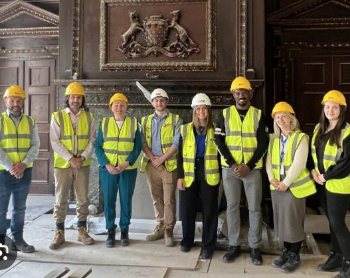Construction wages and apprenticeships on the rise
In 2014/15, for the second year in a row, the number of people starting construction, planning and the built environment apprenticeships in England rose, reaching 17,820. Although the figure was the highest since 2010/11, it was still considerably lower than 2006/07 when 27,300 people started construction apprenticeships.
The news of increase came as construction industry employment continued to grow at a steady rate with figures from the Office for National Statistics showing a 0.5% rise in construction employees over the previous year, from 2,096,000 to 2,106,000.
For some, this growth in employment and apprenticeship numbers provided evidence of the industry responding to warnings about skills shortages.
Tom Crane, an economist at industry analyst Glenigan said, “The increased numbers of apprenticeships may not solve the skills shortage in the short-term, this will be solved by people coming back from other industries and abroad. However, the statistics suggest that the industry is starting to invest more in the future.
"At the moment I think that the fear of the skill shortage is greater than the actual shortage in labour on the ground. The awareness that has been created may be encouraging companies to plan ahead. If we were to have another year with growth of 4-5% then we would have issues, but growth of 2-3% the industry should be able to handle.”
In addition to these figures, analysis of Labour Market statistics revealed that the average weekly earnings of construction workers in the three months to August 2015 was £593, compared with £557 the year before. This rise by an average of 5.1% was the fastest annual increase in any UK industry, together with an increase of 10,000 jobs since June 2014.
Employment Minister Priti Patel said: “The construction industry is a real success story. More than 2 million people are employed in the sector, and their hard work is resulting in more money in their pay packets. Up and down the country more people are in work and enjoying the security of a pay-cheque, helping transform Britain into a higher wage, lower taxation and lower welfare society.”
[edit] Related articles on Designing Buildings Wiki
Featured articles and news
A must-attend event for the architecture industry.
Caroline Gumble to step down as CIOB CEO in 2025
After transformative tenure take on a leadership role within the engineering sector.
RIDDOR and the provisional statistics for 2023 / 2024
Work related deaths; over 50 percent from constructuon and 50 percent recorded as fall from height.
Solar PV company fined for health and safety failure
Work at height not properly planned and failure to take suitable steps to prevent a fall.
The term value when assessing the viability of developments
Consultation on the compulsory purchase process, compensation reforms and potential removal of hope value.
Trees are part of the history of how places have developed.
The increasing costs of repair and remediation
Highlighted by regulator of social housing, as acceleration plan continues.
Free topic guide on mould in buildings
The new TG 26/2024 published by BSRIA.
Greater control for LAs over private rental selective licensing
A brief explanation of changes with the NRLA response.
Practice costs for architectural technologists
Salary standards and working out what you’re worth.
The Health and Safety Executive at 50
And over 200 years of Operational Safety and Health.
Thermal imaging surveys a brief intro
Thermal Imaging of Buildings; a pocket guide BG 72/2017.
Internally insulating a historical building
An experimental DIY approach using mineral thermal lime plaster.
Tree species selection for green infrastructure: A guide for specifiers.
The future of the Grenfell Tower site
Principles, promises, recommendations and a decision expected in February 2025.





















